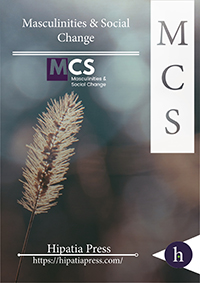Gloria Anzaldúa’s Seven Stages of Conocimiento in Redefining Latino Masculinity: José’s Story
Downloads
Abstract
Using a case study method, this article applies the Chicana feminist framework of Conocimiento as proposed by Gloria Anzaldúa to analyze the transformation of one individual as he readjusts to family life after imprisonment. José’s story is presented in detail and begins with his arrest, conviction and time in prison for selling drugs. After his release from prison to live with his family in Northern California, the narrative then shifts to illustrate the principles of Conocimiento used by Jose’s feminist sisters as a viable tool for transforming masculinities. According to the writings by Gloria Anzaldúa, the process of Conocimiento consists of seven stages that help individuals to reconsider and readjust their ideas, motivations, and beliefs, all in the service of moving forward in their lives. Conocimiento, in conjunction with an environment of caring broadly defined as community, family, and educators, can indeed offer valuable lessons in transforming Latino masculinities.Downloads
References
Acosta, J. F., & Ramos, H. A. (2007). The history of Barrios Unidos: Healing community violence. Houston, Tex: Arte Público Press.
Google Scholar CrossrefAnzaldúa, G. E. (1987). Borderlands—La frontera: The new mestiza. San Francisco: Spinsters/Aunt Lute.
Google Scholar CrossrefAnzaldúa, G. E. (2002). Now let us shift .The path of conocimiento. Inner work, public acts. This bridge we call home: Radical visions for transformation. New York: Routledge.
Google Scholar CrossrefBaca, J. S. (2002). A Place to stand: The making of a poet. New York: Grove Press.
Google Scholar CrossrefBarvosa, E. (2011). Mestiza consciousness in relation to sustained political solidarity: A Chicana feminist interpretation of the Farmworker Movement. Aztlán, 36 (2), 121-54.
Google Scholar CrossrefDelgado-Beltrán, D. (2001). Learning and living pedagogies of the home: The mestiza consciousness of Chicana students. International Journal of Qualitative Studies in Education, 14 (5), 623-639.
Google Scholar CrossrefFregoso, R. (2003). Mexicana encounters: The making of social identities on the borderlands. Berkeley: University of California Press. Hurtado, A. (2011). Making face, rompiendo barreras (breaking barriers):
Google Scholar CrossrefThe activist legacy of Gloria E. Anzaldúa. In G. Gonzalez-Lopez and A.L. Keating. (Eds.).Bridging: how and why Gloria Evangelina Anzaldúa’s life and work transformed our own. Academics, activists, and artists share their testimonios (pp. 49-62). Austin: University of Texas Press.
Google Scholar CrossrefLewin, K. (1948). Resolving social conflicts: Selected papers on group dynamics. Oxford, UK: Harper.
Google Scholar CrossrefMatsuda, M., Charles R. L., Delgado R., & Crenshaw, K.W. (1993). Words that wound: CriticalRace theory, assaultive speech, and The First Amendment. Boulder, CO: Westview Press.
Google Scholar CrossrefPayne, Y. (2006). A gangster and a gentleman. Men and Masculinities, 8(3), 288-297. doi: 10.1177/1097184X05282072
Google Scholar CrossrefSchmitt, J., Warner, K., & Gupta, S. (2010). The high budgetary cost of incarceration. Washington, DC: Center for Economic and Policy Research.
Google Scholar CrossrefDownloads
Published
Almetric
Dimensions
How to Cite
Issue
Section
License
All articles are published under Creative Commons copyright (CC BY). Authors hold the copyright and retain publishing rights without restrictions, but authors allow anyone to download, reuse, reprint, modify, distribute, and/or copy articles as the original source is cited.















